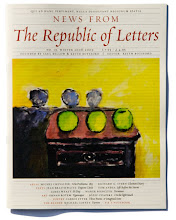I have before me three not very good biographies of writers. I read them because I am a writer and because lives are always interesting. Also because I have long been a foot-note, a mention, ot a contributor to the biographies of writers whose lives have crossed with mine.
The first, Lewis Dabney's remaindered
Edmund Wilson: A Life in Literature (FSG), is a professional job, drably written, and Wilson happens to be one of my household gods -- as who could fail to be who actually read Edward Everett's Gettysburg Address? Wilson was a compulsive diarist and a far better stylist than Dabney, but his introspection was faulty; he looked outwards, not inwards, dabbling in autobiography via his fiction, which Dabney does not admire but I do. The second, Selena Hasting's
The Secret Lives of Somerset Maugham (John Murray), about a writer who 'made it' with his books but not with his life was intended to be boffo stuff but is actually an avid study of a professionally selfish and priapic monster that fails even to inform us to what gender within the homosexual world he belonged. The third, Ingar Sletten Kolloen's
Knut Hamsun Dreamer and Dissenter (Yale University Press), abridged and Englished by 'acclaimed (by whom?) translators Deborah Dawkin and Erik Skuggevik' makes a real hash (Yale should be ashamed of its editing) of a fascinating and quite mad writer.
What reduces all three of these biographies is, of course, the current mantra that human lives are driven by their sexuality -- a gross example of which was a much-praised work on poor Flaubert, a long masturbatory fantasy of the biographer's. In none of these books will you learn much about those with whom they had their amorous or amoral relationships -- for the good and simple reason that such matters are a closed book, one read, at best, only by one of the partners.
Wilson was a wencher, a plump, not overly attractive and overbearing non-lover of anyone but himself. His signal failure to connect derived from the unhappy fact that he was a Writer, and writers are unfit companions or spouses to all but their own fantasies. As Maugham romps with (or through) his various catamites and rival predators, while marrying and even procreating (once) for the sake of respectability, what you see is not what he or they felt, but how useful this patch, 'twixt the fleet and the urinal, was to his stated goal of making enough money to be able to flaunt it. As for Hamsun, so muddied is the tale told, that it is hard to imagine why any woman would even approach him, much less marry him. Power was his game, power and control, and as we should know from history, the lust for power is really a death-wish: real power, like celebrity, wipes out the self.
For writers, maybe alas! sex is the least interesting aspect of their lives, and not one of these biographers has very much to say about our art. They are clearly not writers themselves, so perforce they deal with the trade: how many kroner Hamsun or Maugham earned, how Wilson made his way up into the higher journalism. This part is quite riveting and shows, if that is needed today, just how craven and parasitical most publishers and critics are.
Of course, all three were public figures, and their public selves, their use of their childhoods, their families, their friends, make very good reading indeed. Wilson presided over the demise of those standards -- learning, style, languages, reading -- which put American letters on the map. As much a literary historian as a critic, his range and scholarship put our age to shame. Maugham was long the most-read writer of his day, and it was a lot better stuff than the Da Vinci fraud. Why was he so? Ms Hastings has her theories, which are largely WSM's theories -- that he acknowledged his second-ratedness. But there are few writers (and
none among the books in college courses or workshops) better equipped to teach the young writer his craft. Ever acutely aware of the Reader, careful not to intrude, he is the absolute master of narrative and was (as all writers must learn) a compulsive listener, an eavesdropper of high quality. Hamsun, of whose many novels only a very few are translated into English, was not of much credit to himself, but was a self-made writer and a self-destroyer. It must be said that as a writer of the Right, the extreme right, he doesn't fit the mold.
Hunger is not a novel one reads for pleasure, something that Maugham dispenses in tight little dollops.
The Growth of the Soil, on the other hand, is touching in its agrarian innocence. That he was a convinced Nazi, a friend and follower of Quisling, bothers me not at all. So were many; many too were communists. The mob likes to be led by the nose, by fashion, by ambition. What does bother me is his reason for so being, which is a madman's view of a paradise lost. There is no paradise to be lost, and no new Caesar to lead us back there. And who plays Follow the Leader is responsible for the destruction the leader wreaks -- be he Hitler, Stalin, Murdoch or the latest Pop Star. Writers owe it to their art to have discernment. Hamsun alone paid the penalty.
Lives are the building blocks of history; who we are is every bit as important as what we do. Great literary biographies or autobiographies -- Tchaikovsky's, Paul Leautaud's journals,
Michelet, Berlioz, Benvenuto Cellini -- exist and illuminate: the place, the time, the art. They are a great literary form. In all these I mention, there is not a word about Sex. About which even the smartest of us knows nothing at all, there being nothing to be known.












